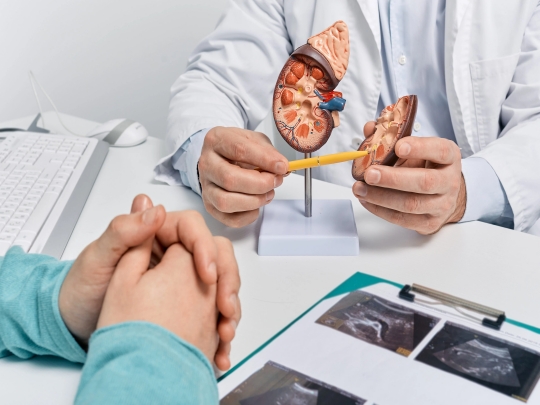
Kidney stones are small, hard mineral deposits in the kidneys and can cause intense pain and discomfort. Understanding kidney stones—what they are, their causes, symptoms, and types—can help you take preventive measures and seek appropriate treatment if necessary. In this blog, we’ll delve into the details of kidney stones to provide you with a comprehensive understanding.
What Are Kidney Stones?
Kidney stones are solid masses made of crystals that form when your urine contains more crystal-forming substances than the fluid in your urine can dilute. They can vary from a grain of sand to a golf ball and may be as small as a pea or larger. While some kidney stones can pass on their own without causing any symptoms, larger stones may lead to severe pain and complications.
Causes of Kidney Stones
Several factors can contribute to the formation of kidney stones, including:
1. Dehydration
Not drinking enough fluids can lead to concentrated urine, making it easier for minerals and salts to crystallize and form stones. Staying adequately hydrated is one of the most effective ways to prevent kidney stones.
2. Dietary Choices
Certain foods can increase your risk of developing kidney stones. For instance, a diet high in sodium can lead to higher calcium levels in your urine, while excessive consumption of oxalate-rich foods (like spinach, nuts, and chocolate) can contribute to calcium oxalate stones.
3. Obesity
Being overweight or obese increases the likelihood of kidney stone formation. Obesity can lead to changes in the urine that promote stone formation, such as increased calcium and uric acid levels.
4. Medical Conditions
Certain medical conditions, such as hyperparathyroidism, gout, and metabolic disorders, can increase your risk of kidney stones. Some urinary tract infections (UTIs) can also lead to struvite stones, a type of kidney stone.
5. Family History
A family history of kidney stones can also increase your risk. If someone in your family has had kidney stones, you may be more likely to develop them as well.
6. Medications
Some medications, such as diuretics, can lead to higher levels of calcium in the urine, increasing the risk of kidney stones. If you have concerns about your medications, discuss them with your healthcare provider.
Symptoms of Kidney Stones
The symptoms of kidney stones can vary depending on the size and location of the stone, but common symptoms include:
1. Severe Pain
The most common symptom is intense pain, often referred to as renal colic. This pain typically occurs in the back or side, below the ribs, and may radiate to the lower abdomen and groin. The pain may come in waves and fluctuate in intensity.
2. Changes in Urination
You may experience frequent urination changes, such as urination, urgency to urinate, or painful urination. If a stone is blocking the urinary tract, it can also lead to reduced urine output.
3. Nausea and Vomiting
Many individuals with kidney stones experience nausea and vomiting due to the pain and the body’s reaction to it.
4. Blood in Urine
Hematuria, or blood in the urine, may occur if a stone irritates the lining of the urinary tract. This can give the urine a pink, red, or brown color.
5. Cloudy or Foul-Smelling Urine
Sometimes, urine may appear cloudy or have a strong odor, indicating a possible urinary tract infection.
6. Difficulty Finding a Comfortable Position
Individuals with kidney stones often have difficulty finding a comfortable position due to the pain. This restlessness often indicates that the rocks may be causing significant discomfort.
Types of Kidney Stones
Kidney stones can be classified into several types based on their composition:
1. Calcium Oxalate Stones
These are the most common type of kidney stones, accounting for about 80% of cases. They form when there is too much calcium and oxalate in the urine. High oxalate foods like spinach, nuts, and chocolate can contribute to their formation.
2. Calcium Phosphate Stones
Calcium phosphate stones are less common but can form when urine is alkaline. These stones are associated with metabolic conditions, such as renal tubular acidosis.
3. Uric Acid Stones
Uric acid stones form when too much uric acid is in the urine. These stones are more common in people with gout, certain types of cancer, or those who consume a high-protein diet.
4. Struvite Stones
Struvite stones can develop in response to urinary tract infections. These stones are made of magnesium, ammonium, and phosphate and can grow quickly, sometimes forming large rocks.
5. Cystine Stones
Cystine stones are rare and occur in people with a genetic disorder called cystinuria, which causes the kidneys to excrete excessive amounts of the amino acid cysteine.
Conclusion
Understanding kidney stones their causes, symptoms, and types can empower you to take proactive steps toward prevention and management. If you’ve experienced kidney stones or have risk factors for developing them, consider lifestyle changes, such as increasing your fluid intake, adjusting your diet, and maintaining a healthy weight.
If you experience symptoms of kidney stones in Bangalore, seeking prompt medical attention is essential. At SSurocare, your healthcare provider can diagnose the type of stone and recommend appropriate options for kidney stone removal in Bangalore to alleviate pain and prevent future occurrences. By staying proactive, you can take significant steps to maintain kidney health and reduce your risk of recurring stones.







